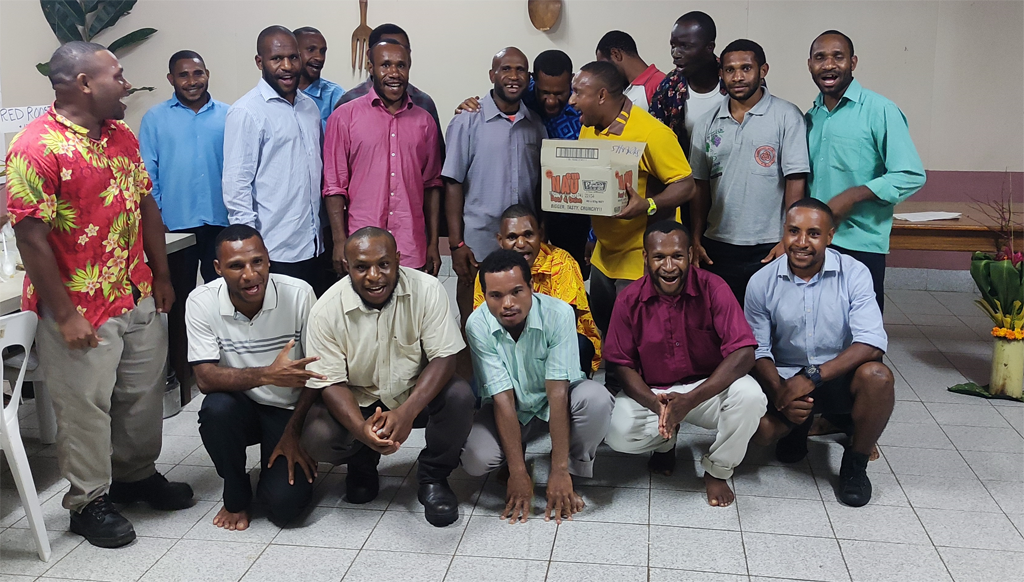
| Time/Week | Monday | Tuesday | Wednesday | Thursday | Friday | Saturday |
|---|---|---|---|---|---|---|
| 8:15 – 9:05AM | English | Sacraments | English | Priesthood | English | Basic Computers |
| 9:10 – 10:00 AM | English | Sacraments | English | Priesthood | English | |
| 10:15 – 11:05 AM | Apologetics | English | Music (Comb) | Synoptics | English | |
| 11:10 - 12:00 PM | Apologetics | English | Music (Comb) | Synoptics | English | Music Practice |
| 2:00 - 4:00 pm | Work Ministry | Work Ministry | Sports | Work Ministry | Work Ministry | Sports |
This course expands upon the foundations
established in the Year 1 English course and is designed to enhance student's
ability to engage with Catholic academic sources while writing accurately and
persuasively for an academic audience. It incorporates both theoretical and
practical aspects of English academic writing. Class discussions and activities
will concentrate on essential skills such as organizing ideas, structuring
paragraphs to form coherent written arguments, identifying key and supporting
ideas, and recognizing the characteristics of various academic genres.
Learning Outcome
- Enhanced vocabulary, grammar,
pronunciation, and conversational skills.
- The ability to summarize, synthesize,
and reference information from church documents.
- Skills in identifying and analyzing
elements typical of academic genres and their rhetorical functions.
- Proficiency in using spoken academic
English in discussions and presentations
The aim of a Catholic apologetics course is to help students
comprehend and articulate the teachings, beliefs, and practices of the Catholic
Church.
Learning Outcome
Students will become equipped to defend their Catholic faith
effectively while also sharing the love and truth of Jesus Christ and His
Church.
Showcase your fashion designs with high-quality fashion photography. My expertise in lighting, composition, and styling ensures that every piece is highlighted to its full potential, creating striking images that capture the essence of your brand.
Learning Outcome
Seminarians will be equipped to explore the
timeless teachings of Jesus within the context of contemporary culture in Papua
New Guinea (PNG). They will articulate how the synoptic Gospels support the
Christian community in nurturing and deepening their relationship with God,
while also fostering critical thinking skills to grasp the deeper meanings
inherent in Jesus' teachings.
This unit engages
students in the study of sacraments and sacramentality by examining the
concepts of 'ritual,' 'symbol,' 'presence,' and 'encounter.' It presents Christ
as the primordial sacrament and the Church as the sacrament of Christ within
the world. Furthermore, the unit explores each of the seven sacraments and
various sacramentals from anthropological, biblical, historical, and
contemporary liturgical perspectives.
Learning Outcome
Seminarians will be equipped to
distinguish and relate the concepts of sign, symbol, and sacrament, while
deepening their understanding of the mystery of the Trinity. Additionally, they
will demonstrate familiarity with contemporary ritual texts used in sacramental
celebrations.
This course provides
an in-depth examination of the priesthood from scriptural, historical, and
dogmatic perspectives. It investigates the development and theology of the
three degrees of the Sacrament of Orders, with a particular emphasis on the
priest's role *in persona Christi*. Additionally, the course explores the
threefold office of priest, prophet, and king, underscoring the
responsibilities inherent to all who are ordained.
Learning Outcome
Seminarians will
receive comprehensive training to effectively integrate the theology of the
priesthood into their individual vocational journeys. They will possess the
ability to articulate the rite and significance of the Sacrament of Holy
Orders, as well as the theology of the priesthood, in accordance with the
teachings established by the Church's councils and magisterial authority.
Furthermore, they will be equipped to clarify misunderstandings surrounding the
Protestant view of Catholic priests as unmarried individuals.
